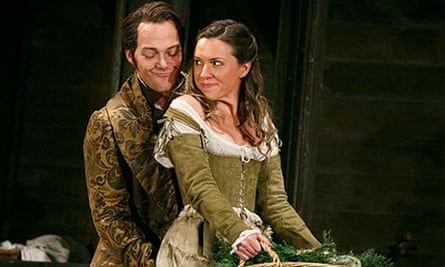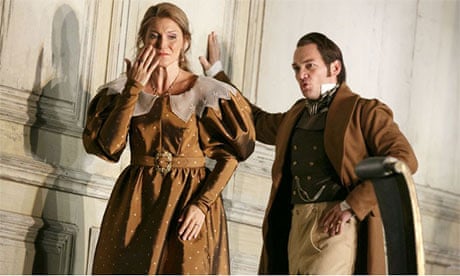David McVicar's 2006 production of Mozart's Le Nozze di Figaro is now on its fourth revival, and one of its strongest outings to date. McVicar has overseen the staging himself, carefully moulding it to his new cast, subtly shifting its emphasis and focus. The results are striking and, in places, radically new.
At its centre is a startling performance from Christopher Maltman as the Count, who, in a brave quest for veracity, de-glamorises a role that many have sexed up, ensuring we will never quite see the character in the same way again. Coldly predatory, unimaginative and self-deluded yet arrogantly conscious of privilege, he terrorises Maria Bengtsson's troubled, adoring Countess with threats of violence, and lords it over his servants with contemptuous hauteur. The natural grit in his tone renders him all the more dangerous. At his side, Bengtsson's vocal warmth makes her shockingly vulnerable. Dove Sono, sung with an unearthly pianissimo, breaks your heart. The final act of forgiveness has rarely seemed so sincere or so disquietingly ambiguous.

Ranged against them are Luca Pisaroni's beautifully sung Figaro and Lucy Crowe's Susanna. The sense of emotional and sexual bonds between them is strong. Pisaroni's weapons are the wit and imagination that Maltman's Count so desperately lacks. It is Crowe, however, pragmatic yet tellingly angry, who seems to embody the work's demands for social justice. Like Maltman and Bengtsson, meanwhile, their performances are marvellously sustained by John Eliot Gardiner's conducting, tense yet spacious, allowing their characterisations to unfold with great subtlety.
There are a couple of lapses. Renata Pokupić's finely acted Cherubino sounded nervous on opening night. Just occasionally McVicar allows the comedy to acquire the brittleness of farce, and a scene in which Marcellina (Helene Schneiderman) and Bartolo (Carlos Chausson) romp on Figaro and Susanna's bed strikes a false note.
In the past, the updating to the eve of the bourgeois revolution of 1830 has always struck me as apt for a work that contrasts differing ideals of monogamy and libertinage. Maltman's Count, however, just for once, made me hanker after the 1780s and a deeper sense of the impending downfall of an aristocracy that is rotten to the core. But even so, it's a richly rewarding evening – provocative, deeply moving and wonderfully humane.

Comments (…)
Sign in or create your Guardian account to join the discussion